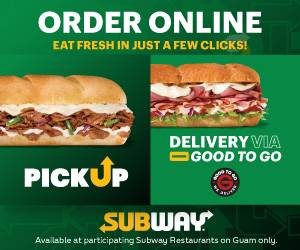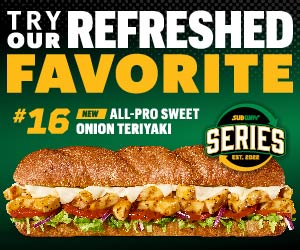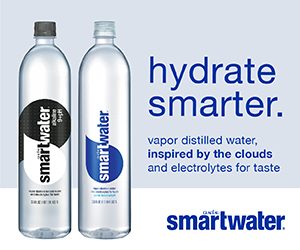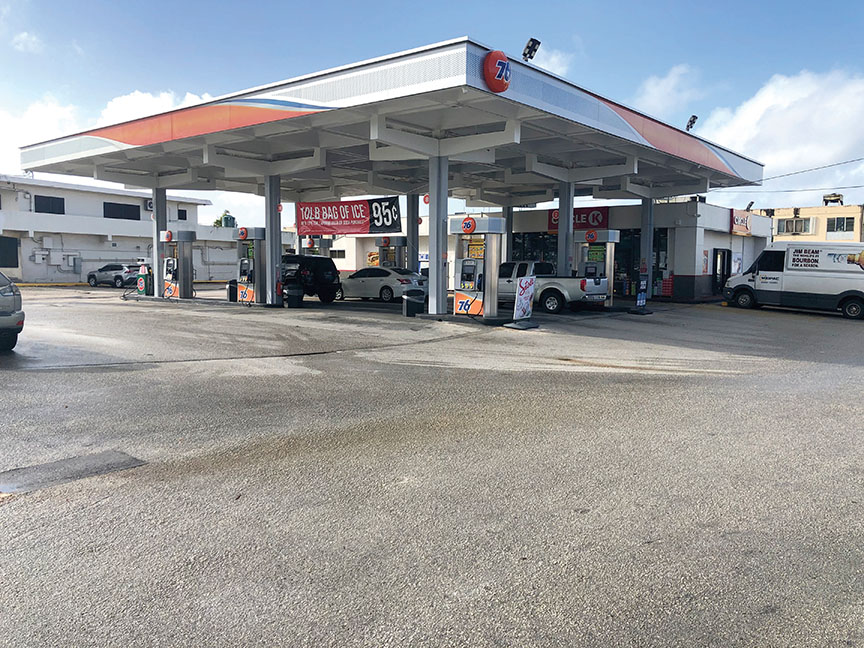
The Circle K76 gas station in Dededo has recently been repainted and is ready to welcome more customers to its pumps and through its convenience store doors.
Photo by Morgan Legel
By Morgan Legel
As 2022 gets well underway Guam drivers are suffering from upticks in the price of gasoline, as well as other economic setbacks.
The good news for the petroleum industry as a whole? Residents don’t seem to slow down on driving; they just change the way they’re purchasing both gasoline and products from service stations.

Chiu
George Chiu, president of Blue Bay Petroleum, which distributes fuel to commercial customers, like hotels, power plants, construction companies and local government, as well as the commercial port of Palau and to commercial and military aviation customers, says that people in the islands will drive regardless of what the price of gasoline is.
“Consumers will spend the same amount of money, but get less gas,” he says, “and they will just have to go to the gas station more often. They’re not lowering their driving amount.”
He says that while some may try to limit their travel, ultimately, people in the islands rely on their cars.
“Living on a small island, people will still drive,” Chiu says. “If you don’t drive, you don’t have legs, and no one on Guam walks.”

Dean
Douglas R. Dean, CEO of South Pacific Petroleum Corp., which operates gasoline stations and convenience stores throughout Guam under the 76 and Circle K brands, says that while there is a little “softness” in the market due to the high prices, consumers haven’t really changed their habits.
“There have always been customers that buy a dollar amount rather than a full tank, and they remain price-sensitive with their purchases no matter what. Those who buy the full tank will still buy the full tank,” he says.
Even so, businesses in the petroleum industry are taking a different approach to customers’ daily travel, offering more services and options from their roadside facilities.
The pandemic has helped to induce a consciousness within residents of the islands as to where they choose to do their shopping. Recently, consumers have favored the smaller shops, with less potential COVID cross-contamination and less constant customers.
ExxonMobil Corp. Mobil Oil Guam Inc., Mobil Oil Mariana Islands Inc. and Mobil Oil Micronesia Inc. do business in Guam, the Northern Mariana Islands and the Marshall Islands, and supply fuel to Palau and the Federated States of Micronesia. The company operates 20 stations in Guam, 11 in Saipan, two in Rota, one in Tinian and six in Majuro. Mobil affiliates serve retail, industrial, wholesale, aviation, marine and government customers.

Hau
Jimmy T.C. Hau, president of Mobil Oil Guam Inc., said that for the Mobil stations, the goal is to offer value and convenience to customers in a safe environment. Currently, that means adding new products and heightened public hygiene awareness of the markets.
“Our stores continually review their product offerings with the aim of satisfying our customer’s needs,” he says. “For example, we added new products such as masks and hand sanitizers, as well as an improved selection of drinks, snacks and more monthly promotional items. We are there for our customers — be it the fuel for their vehicle, or products for the drivers and motorists’ journey.”
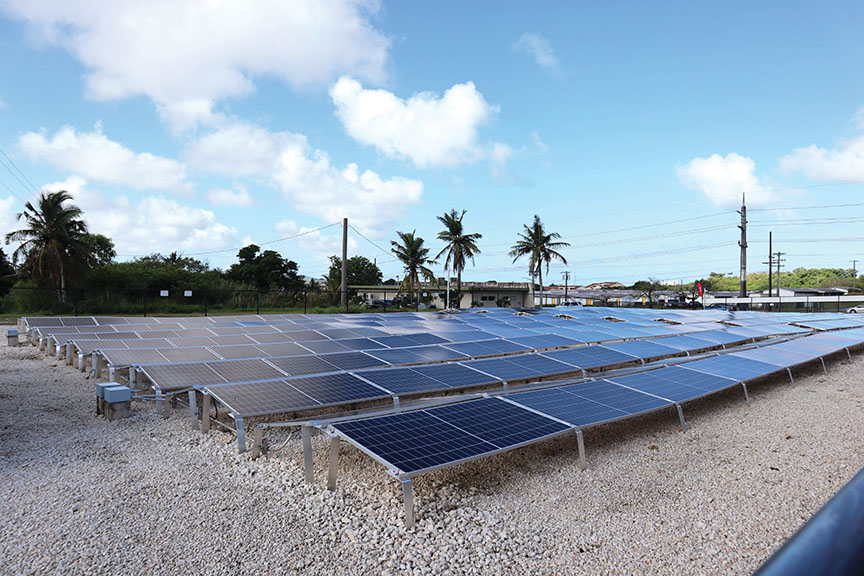
IP&E, which operates Shell Stations in Guam, Saipan and Palau, installed a microgrid — a self-sufficient energy system — to power the gas station at its Upper Tumon Shell Station in December 2021.
Photo courtesy of IP&E
Circle K and 76 locations also expanded their in-store offerings after noticing the change in the way customers approached the convenience store.
Dean says, “The convenience store industry did see the pandemic as a driver of people to use those stores more. They are quick enter, quick shopping, like get your basket filled and get out.”
Even with the quicker shopping experience, Dean says he did notice customers were buying more.
“There was increase in basket and load size because people saw the stores as not crowded, and we actually found there was a more ‘one-stop’ shopping trend, and to a great extent, that hasn’t changed,” he says. The chain brought in more grocery-type items, including baking goods to cater to that demand.

Bamba
Brian J. Bamba, managing director of IP&E Holdings LLC., which does business as Shell, says that convenience stores have been surprisingly busier throughout the pandemic.
“While we saw decreases in fuel demand as a result of lockdown measures, our Foody’s locations were still very busy as customers looked to us for their favorite local soup, beverage, snack and even pandemic personal protection equipment needs,” he says.
“Convenience stores across the nation played a critical role for communities they serve during the pandemic — we were grateful to be there for our customers and provide them a safe environment for them to shop,” Bamba says.
One of the ways customers were put first was anticipating their needs.
“Our goal is to bring customers what they want in a convenience store, and that requires us to listen and adapt,” Bamba says. “We appreciate that customers have choices, not only on what they want to purchase, but also how they want to purchase. We try to exceed expectations and bring more value to them in the process.”
However, he says the change in the way the convenience stores operate has been a challenge as well.
“The stores have had to deal with a lot of change throughout the pandemic, ultimately we want to ensure our employees and customers are kept safe,” he says. “We adhered to all the public health mandates for food service, so at times we had to discontinue our food bar and change the way customers handled items. We also saw the impact the pandemic had on vendors, which added to supply chain issues with all wholesalers. It’s improving, but we still see that across many retail operations on island.”
Between the pandemic’s economic factors causing disruption to gas stations and fuel sales, like a smaller customer base because of a lack of tourism and the need to revamp convenience stores, other issues still lay on the horizon, like the rising price of fuel and crude oil, due to geopolitical issues.
In 2021, the gross margin, or markup, on gasoline was 30.9¢ per gallon, which equated to 10.2% of the average price, which is slightly lower than the average of the past five years before that.
Chiu says crude oil has been priced higher previously, but the cost of gas has never been this high.
“You have the oil keg nations that are controlling the release of supply into the marketplace,” he says. “We’ve been spoiled for I don’t know how long for how low the price of a barrel of oil [was], and I want to know why this time around the gas is so high?”
“If you correlate the cost of the raw material to the final end product it has not gone up the same amount,” he says.
However, gas prices are at an all-time high worldwide.
“Recent geopolitical events, the global pandemic and market conditions have caused increased volatility in global crude oil and petroleum product prices,” Hau says. “This may have contributed to reduced customer demand at the pump.”
Aside from gasoline and cars, other fuel sectors also suffered due to the pandemic.
“Initially, back in January and February, we did see a drop in sales, but even with price increases it wasn’t too bad,” Chiu says. “Where we saw the huge drop was in the marina sales, because there’s no tourism in Palau, and those sales consist of those who take the tours to Rock Island. … In my experience, most of the sales are down due to tourists, not the price of fuel.”
Bamba says jet fuel sales have changed as well.
“Jet fuel is directly related to aircraft operations, and while there were fewer passenger flights, we saw an increase in cargo flight operations. Demand for jet fuel was lower, but we see airline activity increasing in the coming months.”
Dean says the tourism industry accounts for 10% to 15% of all sales of gasoline and within the convenience stores, “And there’s nothing you can do to make up that loss. If their feet aren’t on the ground, you just can’t sell to those non-customers.”
Many other industries on island have suffered supply chain issues throughout the pandemic, but Hau says that while there might have been issues, they were bearable.
“Despite the supply issues from the global pandemic and the recent geopolitical events,” he says, “Mobil continues to leverage its strong regional supply networks to deliver reliable supplies of quality fuels to our customers in Guam and the Northern Mariana Islands.”
Through it all, Dean says there is still something positive out there for consumers.
“The good news is there’s gasoline available,” he says. “If you go back to the 1970s, there was a rationing of gasoline and a difficulty in obtaining it.”
And after Super typhoon Pongsona in December 2002, fire at the Port of Guam terminal site blocked access to gasoline supplies for Guam and caused the shutdown of Apra Harbor — the primary supply and fuel delivery point for the island, causing immediate long lines and rationing at gas stations.
“Shell customers can be assured that they will continue to get consistent service at all our locations,” Bamba says. “Our team members are guaranteed to deliver a smile, treat you kindly and show that we care. We have some new ideas rolling out over the next 18 months and we are pretty excited.”











